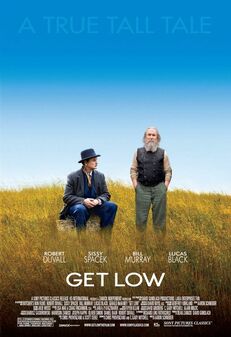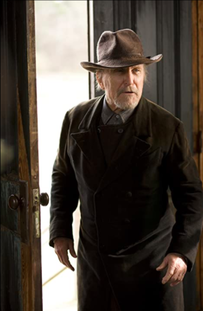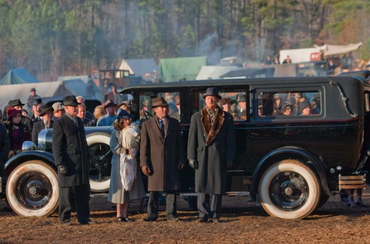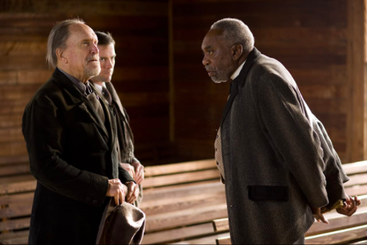
www.pluggedin.com/movie-reviews/getlow/
Whilst Hollywood releases films in their droves, year after year, so few of them are ever spiritually conscious enough or caring enough to tackle life’s ‘big questions’ in a faithful, artful and engaging manner. The subject of spirituality is often mentioned, yes, but such action sadly appears to serve only as a somewhat tick-box exercise to appeal to Christian audiences. So, when it comes to selecting a suitable new film for the Faith & Film blog – one that specifically engages with Christian spirituality consistently throughout - I’m often left with no other option but to fervently pray that the Lord would highlight a film to me that may have flown under my radar, before the looming deadline.
And whilst yes, I admit that prayer is and should always be my first port of call here at the blog, I’m thankful that the Lord heard my prayer and drew me to Get Low – a small, quietly thoughtful film which intertwines poignant human drama with spiritual discourse, highlighting issues which effect and apply to us all. Granted, the circumstances in which our protagonist Felix Bush (Robert Duvall, in full grumpy mode) finds himself are wholly unique to him, but we come to learn that he – just like any other human being – seeks to process and rid himself of the emotional and spiritual burdens he has been caused to bear in life. But how does one find a release from their shame and guilt, and receive forgiveness when others won’t forgive them, or they cannot find it in their heart to forgive themselves? Get Low has but one answer, and pleasingly, you won’t have to look very far to find it…
Marking the directorial debut of Aaron Schneider (and later, 2020’s Greyhound), Get Low is based upon a “true tall tale” of a hermit in 1930s Tennessee, who decided to organise a funeral party for himself whilst he was still alive. Now an old man, Felix understands that it won’t be too long until he’s got one foot in the grave. And so, in his determination to pre-empt it, he turns what could be a macabre moment into an event to which he invites the entire community – albeit one that is wary of the old man and spreads unsavoury rumours about him… But you see, that’s exactly what Felix is interested in. He’s grown curious about what the townsfolk think of him and wants to give them the opportunity to voice their opinions publicly, to him. Felix, however, has a story of his own to share – a public confession of his shame and guilt for his part in a tragic occurrence that occurred forty years ago, which he has only ever shared with a local preacher (Bill Cobbs). But can he muster up the courage to speak the truth so this tortured soul might be forgiven and freed?
At times, Get Low appears to be less interested in the motifs that it raises, than the curmudgeon at its core. For instance, director Schneider and his screenwriters (Chris Provenzano, C. Gaby Mitchell & Scott Seeke) often choose to revel in Bush’s unpredictable, eyebrow-raising tendencies - most notably his inability to smile for a photographer, and his admission that he no longer wears any underwear. But when the filmmakers attempt to get underneath Bush’s hardened emotional exterior and oddball nature, we find a man who’s longing to re-join society, after imprisoning himself within a place of solitude for forty years. He longs not only to be set free physically, but emotionally and spiritually. So, he visits a local preacher (Gerald McRaney), presents him with a large amount of cash and asks for a living funeral. Naturally, Rev. Horton is perplexed and asks Bush to explain, to which the old-timer simply replies: “(It’s)…’bout time for me to get low”. One would assume that Bush is referring to one’s physical and spiritual posturing before the Lord, when a person typically decides to surrender their life to God. He describes it as simply “(getting) down to business”, followed by presenting Rev. Horton with a balled-up wad of money and requesting that he provide him with a living funeral, in which people will be invited to share their thoughts and stories on Mr. Bush, unfiltered, directly to his face.
Rev. Horton naturally tries to dissuade Bush from permitting such gossip to spread throughout a house of God, and rightfully draws the old man toward the most pressing of matters: not what people say about Him, but what God will say about him when the judgement comes. “…what matters when you come to the end of your life is that you're ready for the next one. Have you made peace with God, sir?”, he asks. Bush, confused, protests: “I paid”. Horton attempts to correct him again:
Horton: “Well… You can't buy forgiveness, Mr. Bush. It's free. But you do have to ask for it.”
Bush: “Nothing in this world is free, preacher.”
In spite of Horton’s faithful witness, Bush just can’t seem to understand the simplicity of what it means to ask for forgiveness from the Lord. For forty years, he’s lived a life wracked with shame and guilt for his mistakes. He’s believed that to receive forgiveness and be granted absolution by God and those around him, he must pay – monetarily speaking, but also by punishing himself through living in crushing isolation. For Bush, his cabin in the woods is more of a jail cell, than a sanctuary. But we know that God promises for those who come before Him in penitence and faith, confessing their sin and asking for forgiveness, He freely grants it because of the saving work of His Son Jesus Christ: “…if we confess our sins to Him, He is faithful and just to forgive us our sins and to cleanse us from all wickedness” (1 John 1:9, NLT). Whilst Bush believes that he doesn’t deserve forgiveness, or if he can receive it, must pay for, and earn it in the eyes of God and others, the remarkable accomplishment of Jesus’ atoning, sacrificial work on the cross says otherwise. In Christ alone, we find freedom from the burdens of our sin and complete forgiveness, even when the world won’t forgive us. We may not deserve it for all the wrong that we’ve done, and yet, He is merciful. Just as it was a perplexing reality for those who have been saved, it is also for Bush. Thankfully, it isn’t so perplexing that we must distance ourselves from the God who loves us so dearly.
In its final third, Get Low shows a darker side to Bush – seen in the very public revelation of his past indiscretions. With the help of another local preacher named Rev. Charlie Jackson (Bill Cobbs), Bush is finally compelled to confess to his actions and ask for forgiveness in front of the entire town, at his funeral party – but also to a local woman named Mattie (Sissy Spacek), with whom he once shared a romance and later hurt her. At first, he protests to Jackson that his act of penance (locking himself away for forty years) is enough to make amends or to atone for his sins. But Jackson disagrees: “…you know it isn’t (enough)”, he says to Bush. And so, at the funeral party, Bush finally begins to tell all:
Bush: “When I told Charlie what I'd done, he told me to confess to God and the law… so I could get forgiveness. But I didn't want forgiveness. I needed to hold on to what I did. To be sick from it every day of my life. So, I never told nobody else.”
In preparing to go on with his story, Bush stumbles – he’s unsure of how to go on with telling the truth. But he sees Mattie in the crowd, and he directs his confession toward her. He continues, speaks the truth, and soon finds an emotional release from the burdens of his mind and heart – seen in the joyful reconciliation between him and Mattie, but also in his physical appearance. He looks healthier, lighter – free. In that moment, Bush’s actions show the healing power of confession. It mends relationships around him and (to some extent) himself. For an act that he dreaded for so long, he never knew how liberating it could be to be released from such darkness within his heart. And this is what God wants for His creation. He longs for us to seek forgiveness and repentance first from Him (for the sake of our souls), and then from others: “Confess your sins to each other and pray for each other so that you may be healed. The earnest prayer of a righteous person has great power and produces wonderful results” (James 5:16, NLT). Truly then, “Confession is good for the soul.” For if we, who have sinned against God and others, truly confess, and turn away from our sins with the help of our Father in Heaven, our souls will be mended and saved: “…if you confess with your mouth that Jesus is Lord and believe in your heart that God raised him from the dead, you will be saved. For with the heart one believes and is justified, and with the mouth one confesses and is saved…” (Romans 10:9-10, ESV).
The film isn’t clear on whether Bush sought out and received forgiveness from the Lord, but his story serves as a beautiful reminder of the freeing power of confession. It shows that the act of confession, seeking forgiveness and turning away from our sinful ways brings restoration between friends. But how much more important is it that we seek all of that from our Creator, God, who is supposed to be our closest friend? Ultimately, Get Low teaches that confession is good for us now, but biblical confession is essential for the soul now, and in eternity.




 RSS Feed
RSS Feed